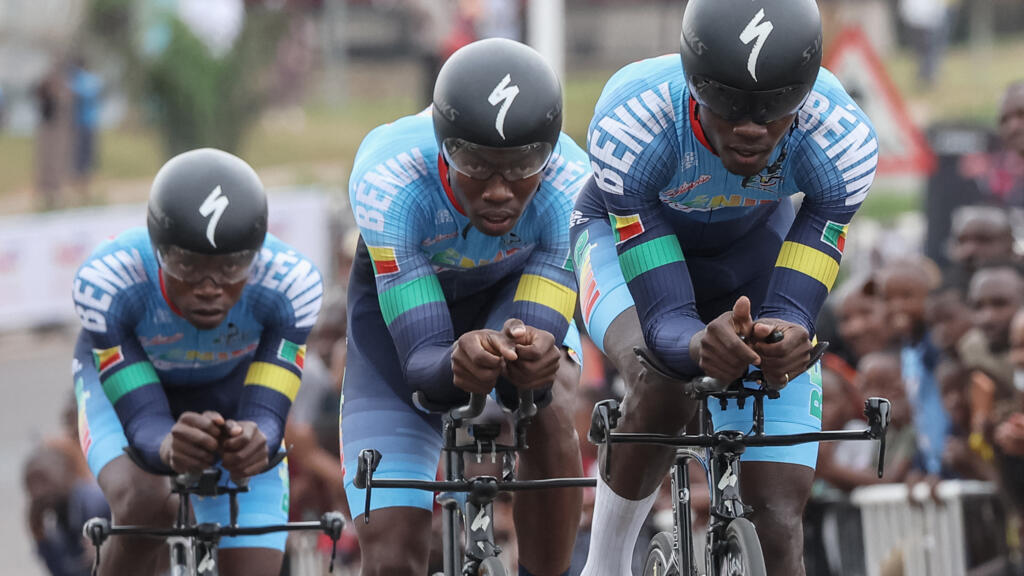Elite women and men cyclists are this weekend vying for glory in the final races of the UCI road world championships in Rwanda’s capital Kigali. As the event wraps up, organisers are reflecting on the positive impact of bringing such a competition to the African continent for the first time.
During his address to the thousands packed into the BK Arena in Kigali for the opening ceremony last Sunday, David Lappartient, the boss of the Union Cycliste International (UCI) basked in the moment of history.
Advertisement
“What a pleasure to be here in Kigali,” he beamed. “When I was running for the presidency of the UCI in 2017, it was our collective dream to bring our pinnacle event to Africa and it is in Africa, in Rwanda in Kigali.”
After the cheers had subsided, Lappartient lavished praise on the Rwandan leader Paul Kagame for his support. “Because without his vision and our vision, the championships would have been impossible,” he added. “And we are so proud.”
Citing the TV deals in 130 countries to broadcast the championships, he added: “It means hundreds of millions of people will be able to discover your passion and the beauty of your country.”
Advertisement
“For Rwanda, this is more than an event,” said Rwanda‘s Minister of Sports Nelly Mukazayire. “It’s a commitment to the next generation.”
Africa is ready
For Kimberly Coats, CEO of Team Africa Rising, a non-profit organisation working for the development of cycling on the continent, it was a good choice to make Rwanda the first African country to host the event.
“They have the infrastructure and they have the resources to be able to do the races,” Coats told RFI.
Advertisement
“But ultimately I don’t want the narrative to be: ‘Well, that was fun. But Africa’s not ready.’
“Because Africa is ready. We need sponsors and prospective sponsors to see that the continent is worth the investment.”
Australia beat France to keep mixed relay title at world championships in Kigali
Amazing career
Coats recalls the story of Adrien Niyonshuti who is now coaching the Benin team and providing the guidance for youngsters entering the sport.
Advertisement
“He’s he’s had an amazing career,” she said. “He’s beloved in the cycling community and to see the trajectory of his life. I know that we made a difference to Adrien.
Niyonshuti, who competed for Rwanda in the cross country mountain biking at the 2012 Olympics in London at the age of 25, finished second to last.
“People in Rwanda were like: ‘Why didn’t he win?’ But that wasn’t the goal,” Coats explained. “The goal was for him to finish and he did. And he made history.
Advertisement
Teenagers take centre stage at road world championships in Kigali
“And what’s more important is that Adrien is going to make a much more significant impact long term than we ever could. We’re outsiders. We did the things we needed to do to help him be successful. And he showed up to the bike every single day and worked his hardest.
For Coats, the championships in Kigali were more about bringing the experience of high level racing to the African teams.
Advertisement
In the prelude to the world championships, she organised the participation of the Benin women’s cycling team in the inaugural women’s race at the Maryland Cycling Classic around Baltimore.
None of the four riders finished the 115.2km course.
“We were hoping one of them would, but they did about half the race,” said Coats.
“After that experience, their comments were: ‘OK, we get it. We get it now. This is a whole new level. We have to train harder, manage our diet better, all those things that make a world class cyclist.'”
Advertisement
Wheels in motion
Back at the first world road race championships in 1921 in the Danish capital Copenhagen, only an amateur men’s road race was staged.
Fast forward just over a century, 13 disciplines were listed, including a new separate event for the women’s under-23 individual time trial (ITT).
In the three years since a medal has been handed out in the category, the under-23 champion was simply the woman in that age bracket who finished highest in the women’s elite ITT.
Advertisement
Zoe Bäckstedt from Britain won the 2025 race. She covered the 22.6km course in 30 minutes, 56.16 seconds. Viktoria Chladanova from Slovakia was second and the Italian Federica Venturelli was third.
Martha Ntakirutimana from Rwanda was the highest placed African at 27th, some five minutes off Bäckstedt’s pace.
Of the 14 local riders in the 47 starters, the top three finished 27th, 32nd, and 34th. One did not finish and the other 10 occupied the last 10 places.
Advertisement
For Coats, despite the challenges, the wheels of the future are already in motion, on and off the track.
“There’s still a long way to go. Lack of racing, lack of ability to travel, poor finances. There are a lot of things going against African cyclists that European cyclists just don’t face.
“But now we have this whole group of young men and hopefully African women that are coming back into the sport as coaches, she says.
“That’s where we’re going to see the biggest long term gain in the sport.”

